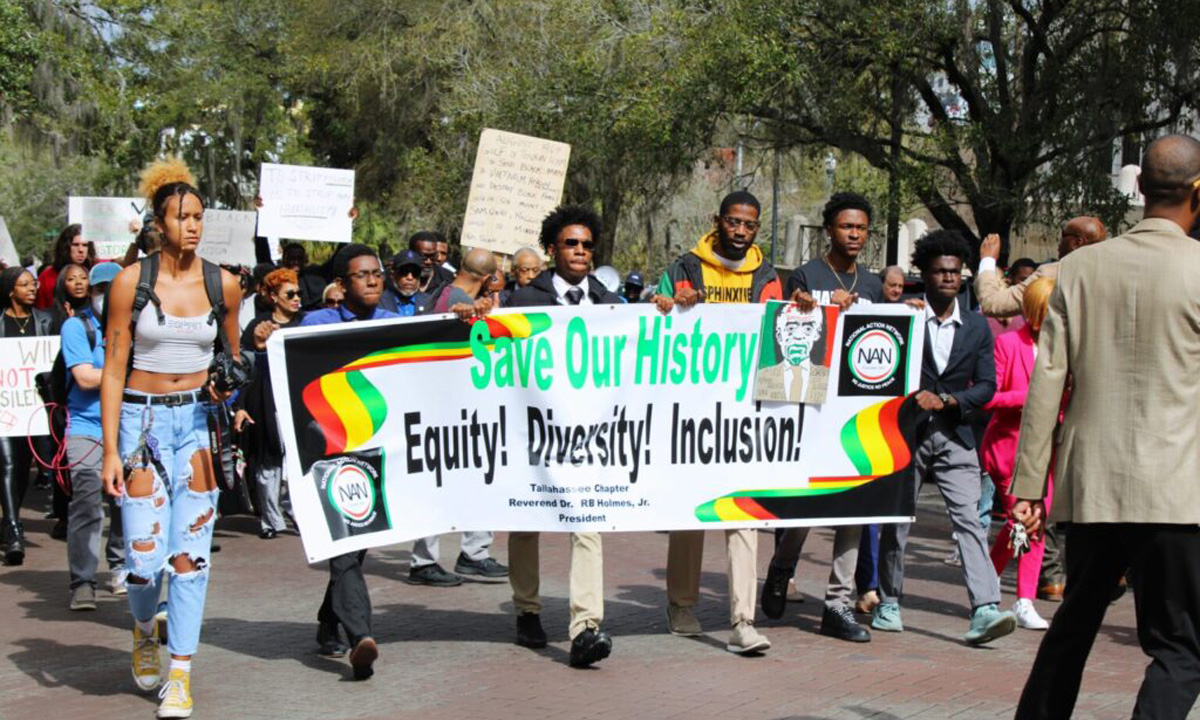‘Please Table This Rule’: Inside Florida’s Fight Over African American History
FL Board of Education approves African American history standards; critics call them ‘incomplete.’

Get stories like these delivered straight to your inbox. Sign up for The 74 Newsletter
Students at Florida public schools will now learn that Black people benefitted from slavery because it taught them skills. This change is part of the African American history standards the State Board of Education approved at a Wednesday meeting.
The description of slavery as beneficial is not the only grievance parents, teachers, education advocates and politicians had with the new standards. People speaking at the Wednesday meeting generally called out the diluting and omissions of history. For example, instruction at the elementary school level is largely limited to identifying famous Black people, and high school teachers will talk about the “acts of violence perpetrated by African Americans” at the 1920 Ocoee Massacre, in which a white mob killed at least 30 Black people.
“Please table this rule and revise it to make sure that my history our history is being told factually and completely, and please do not, for the love of God, tell kids that slavery was beneficial because I guarantee you it most certainly was not,” said Kevin Parker, a community member.
Though the public testimony period lasted over an hour, most of the people objected to the adoption of the standard, with supporters of it waving from their seats. Paul Burns, the chancellor of K-12 public schools, defended the standards, denying that they referred to slavery as beneficial.
“Our standards are factual, objective standards that really teach the good, the bad and the ugly,” he said.
Board member Kelly Garcia upheld the standards and said that none of the backlash she read about them before the meeting pointed to specific concerns. A coalition of Black leaders and community groups — Florida Education Association, FL’s NAACP and The Black History Project, Inc. and Equal Ground — sent a letter to the board on Monday in opposition to the standards.
Whitewashing history
State Sen. Geraldine Thompson, representing part of Orange County, and state House Democrat Anna Eskamani of Orlando showed up to speak out against the standards.
“When I see the standards, I’m very concerned,” Thompson said. “If I were still a professor, I would do what I did very infrequently; I’d have to give this a grade of ‘I’ for incomplete. It recognizes that we have made an effort, we’ve taken a step. However, this history needs to be comprehensive. It needs to be authentic, and it needs additional work.”
A 1994 Florida statute requires schools to teach African American history, but Gov. DeSantis has been chipping away at the legacy of the law. Last year, the Legislature passed HB 7, which restricted certain conversations about race and gender in schools and workplaces. Regarding race-related discussions in schools, the law says that students must not feel guilt over past actions of people of the same race.
At the beginning of the year, the governor’s rejection of the New York-based College Board’s AP African American History pilot course amassed nationwide backlash for trying to whitewash history.
“To be discussing African American history in this moment, with no one present who has felt the pain of the infliction of harm on African Americans. It’s overtly problematic,” said former state politician Dwight Bullard, pointing at the non-Black members of the board.
“Part of the reason the ’94 statute exists is because the state tried to cover up the Rosewood massacre. So, by the very admission of the state, the reason that we need a stronger statute that covers African American history, a broader statute is because of the necessity or the failures of your predecessors. So, I simply ask that you table this amendment until those closest to the pain have access to the power.”
Florida Phoenix is part of States Newsroom, a network of news bureaus supported by grants and a coalition of donors as a 501c(3) public charity. Florida Phoenix maintains editorial independence. Contact Editor Diane Rado for questions: info@floridaphoenix.com. Follow Florida Phoenix on Facebook and Twitter.
Get stories like these delivered straight to your inbox. Sign up for The 74 Newsletter

;)